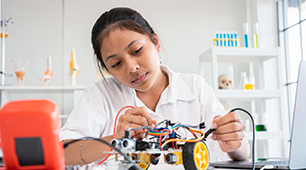03 Dec 2024

Climate change is impacting our planet and our lives in foundational ways. As the Earth heats up, the rising temperatures are triggering destructive wildfires, storms and floods which affect the crops we grow, where and how we live, what we wear and our health. How can school-age education help prepare engineers of the future to work in a climate changed world?
The International Education group at Cambridge University Press & Assessment (Cambridge) and Cambridge Zero have published a new introduction paper to help advance climate change education in schools and bridge the gap to engineering jobs of the future.
‘Empowering engineers of the future to tackle climate change’ has been developed by engineering and education experts and describes ways to upskill and motivate school-age students to become engineers ready for a climate-changed world. The paper examines how climate change-related research and teaching can be embedded into Cambridge curricula and resources for students aged 3 to 19.
Some of the recommendations for teaching and learning include:
- Increased focus on building critical thinking skills – which help develop the problem solving and design thinking capabilities needed for engineering
- Engaging students with real-world problems – through case studies and open access digital tools – to develop skills that relate to sustainability, such as multidisciplinary and systems thinking
- Providing opportunities for hands-on experiential learning – which give learners space to be creative and the ability to connect theory with practice
We are coordinating the launch of the introduction paper alongside a new guide to help teachers in the classroom with climate change education. ‘Getting started with climate change education’ links research with practical ideas to help teachers apply it to their lessons.
Christine Özden, Global Director, Climate Education, Cambridge University Press & Assessment said: “International education at Cambridge reaches 100 million learners around the world and our research tells us that engineering is the second most popular degree subject that our students go on to study. Given how crucial engineering is in managing climate change, we not only have an incredible opportunity to support learning to tackle the climate crisis through this route, but a responsibility. This is why we are working with experts to embed climate change education into our programmes and resources for schools to support potential engineers of the future.”
First-ever global winner of Engineering Award announced
As part of its commitment to enhancing climate change education and its application to engineering, Cambridge has also announced the Sustainability Winner and the first ever Engineering Winner for its global science competition for students aged 14-16.
The Engineering Award goes to Poon Han Kim, Chong Cheng Yi and Douglas Yip Shi Jie from Tzu Chi International School Kuala Lumpur, Malaysia, for their research into how to protect crops from flood and drought. They found that, between 2021 and 2022, floods caused a total loss of MYR138.6 million (GBP22.9 million) in agricultural, fisheries and livestock sectors in Malaysia alone. Inspired to find a potential solution, they used 3D modelling to design a flood barrier.
The Sustainability Award goes to Charis Tan Lynn Yee, Isabel Liau Jin Ru, Ng Yan Toong, Shriyadita Muralitharan, Yee Li Khai and Iman Nazeem Chaudhry from Eagles Grammar International School, Malaysia, won the Sustainability Award for their investigation into how phytoremediation (using plants to clean contaminants in soil, air or water) can be used to reduce eutrophication (excessive build-up of organic pollutants in water).
The Cambridge Science Competition gives schools an opportunity to engage students in real-world science and develop ‘design thinking’ from a young age – one of the recommendations of the introduction paper.